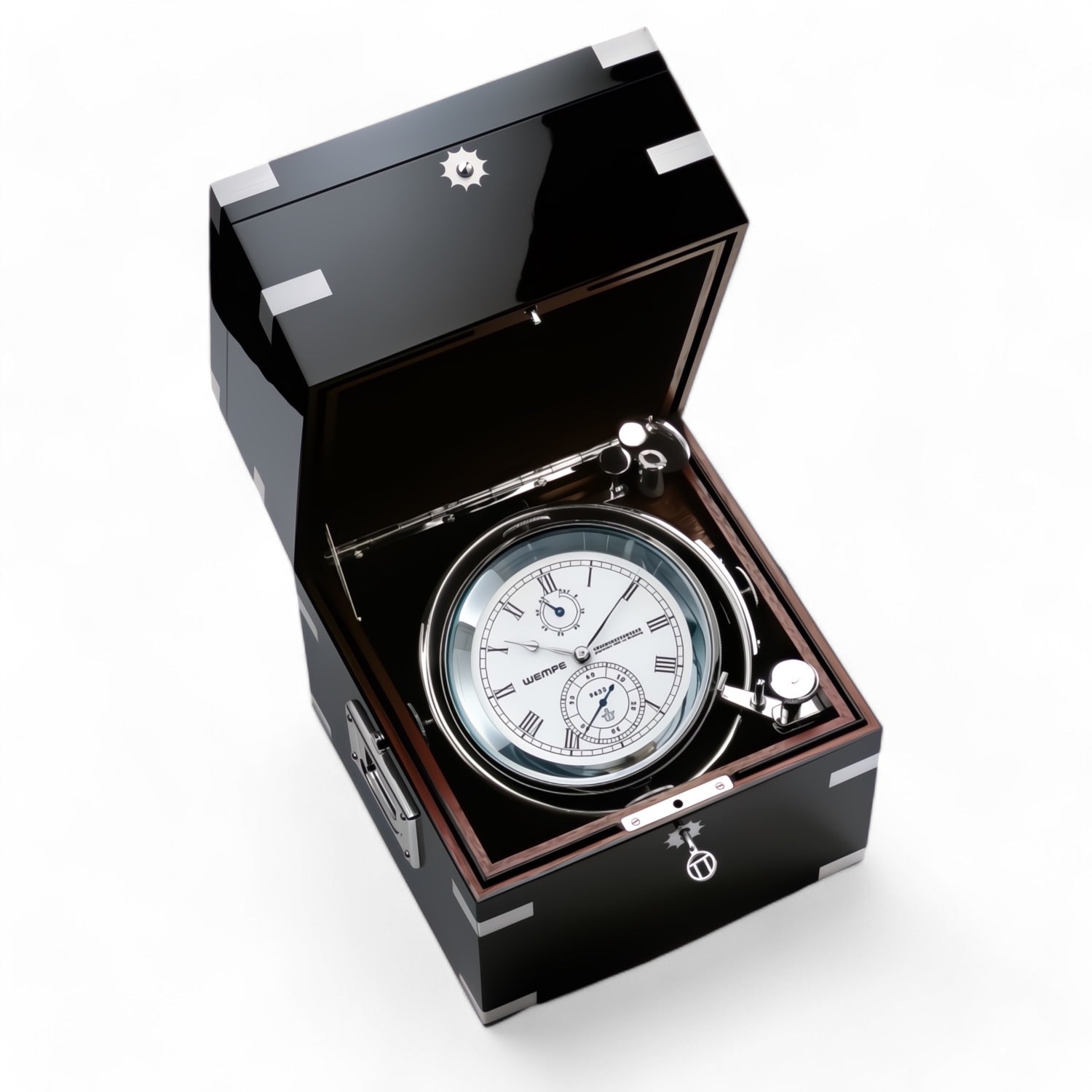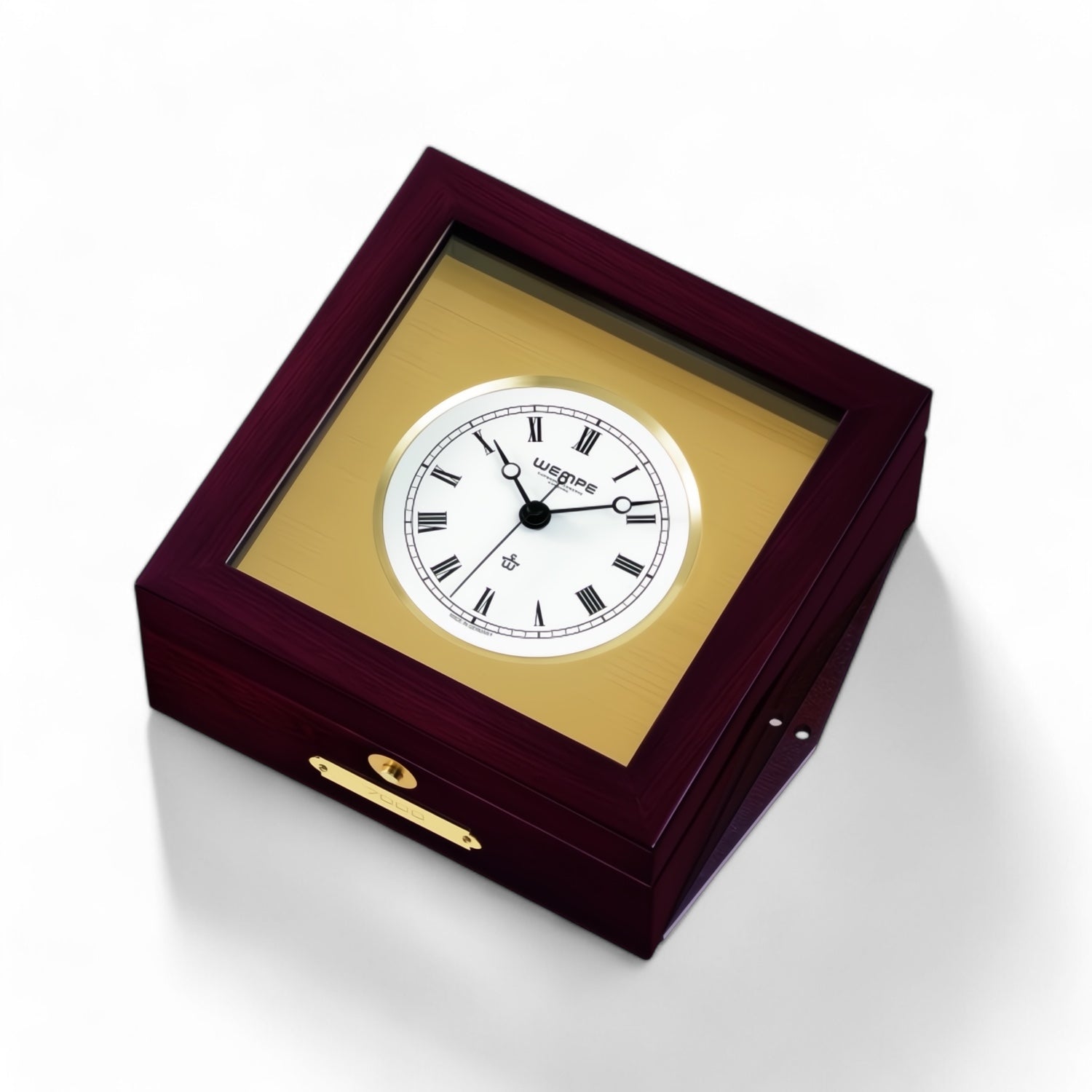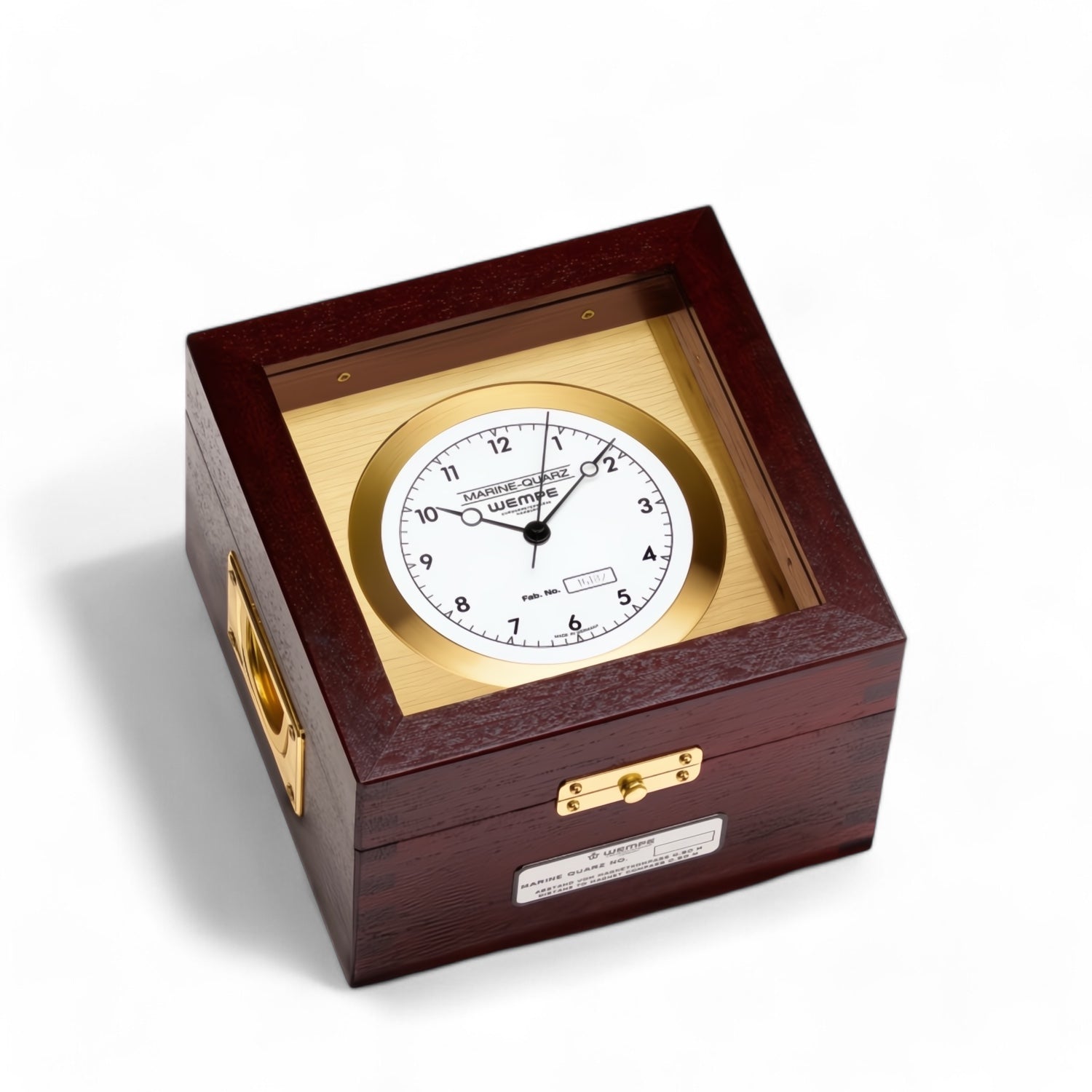Chronometers, de ultieme must-have op tijdsgebied
Als je een beetje van avontuur houdt (of gewoon van stijl), is een chronometer de ultieme must-have. Dit is niet zomaar een klok – dit is de klok die trillingen, vocht en temperatuurwisselingen overleeft en toch altijd de juiste tijd blijft geven. Of je nu de koers van je boot volgt of je huis wat maritieme flair wilt geven, een chronometer is je betrouwbare partner in crime, die net zo stoer is als je zeewaardige plannen. Kortom, een chronometer is de klok die je wilt, niet de klok die je moet hebben. Dus, waarom zou je kiezen voor iets minder dan perfectie?
5 producten
5 producten
Sorteer op:


Autonautic professionele marine chronometer in elegante doos 200 x 200 x 185 mm
€459,80
Eenheid prijs PerAutonautic professionele marine chronometer in elegante doos 200 x 200 x 185 mm
€459,80
Eenheid prijs PerDeze elegante vergulde messing klok staat op een hellend bed voor optimale zichtbaarheid, met een bovenkant die geopend of gesloten kan blijven dankzij het heldere paneel in het deksel. De klassieke professionele marine quartz chronometer, met Romeinse cijfers, is geplaatst in een gelakte houten en messing behuizing. Hoewel het technisch gezien geen traditionele chronometer is – die een constante foutmarge hanteert – behaalt het hoogwaardige quartz uurwerk de hoogste beoordeling die een quartz mechanisme kan krijgen.
De behuizing is vervaardigd uit beukenhout met een mahoniehouten afwerking, gecombineerd met 18-karaats verguld messing dat een luxe uitstraling geeft. De klok is omhuld door een solide messing lunette en biedt een stijlvolle Romeinse wijzerplaat met een secondewijzer. Met een indrukwekkende nauwkeurigheid van minder dan 1 seconde fout per dag, is deze marine chronometer een perfect voorbeeld van vakmanschap en precisie


Autonautic professionele quartz cardanische chronometer in luxe doos 200 x 200 x 185 mm
€1.576,63
Eenheid prijs PerAutonautic professionele quartz cardanische chronometer in luxe doos 200 x 200 x 185 mm
€1.576,63
Eenheid prijs PerProfessionele quartz cardanische chronometer. Een klassieke professionele marine quartz chronometer, uitgerust met zowel Romeinse als Arabische cijfers, stijlvol gemonteerd in een geverniste houten en messing behuizing. Hoewel dit technisch gezien geen traditionele chronometer is — een klok met een constante foutmarge — bevat deze chronometer een quartz uurwerk van de hoogste kwaliteit, vervaardigd door de gerenommeerde Duitse fabrikant U.T.S. Co. Dit uurwerk heeft de hoogste beoordeling binnen zijn categorie en wordt ook gebruikt in de prestigieuze Junghans quartz klokken.
De kast is vervaardigd uit fijn beukenhout met een mahonie-afwerking en is voorzien van 18-karaats vergulde accenten op alle metalen onderdelen. De robuuste messing behuizing bevat een 5 mm dikke kristalglazen lunette met fraai afgeschuinde randen. Met een wijzerplaat van 12 uur, Romeinse cijfers en een secondewijzer, biedt deze klok een indrukwekkende combinatie van traditie en moderne techniek. Nauwkeurigheid gegarandeerd: minder dan 1 seconde fout per dag.

Wempe unified chronometer - kaliber 5-uurwerk, gangreserve van 56 uur
€29.750,00
Eenheid prijs PerWempe unified chronometer - kaliber 5-uurwerk, gangreserve van 56 uur
€29.750,00
Eenheid prijs PerDe Wempe unified chronometer is een meesterwerk van vakmanschap en precisie, een investering in tijdloze kwaliteit en verfijnde techniek. Al meer dan 75 jaar wordt dit mechanische instrument met de hand vervaardigd volgens de hoogste standaarden van WEMPE, wat het label “Made by Wempe” met trots draagt. Met afmetingen van 200 x 200 x 210 mm straalt het geheel een klassieke elegantie uit. De behuizing is gemaakt van hout met een pianolak-afwerking, terwijl de gepolijste messing cardanische ophanging zorgt voor stabiliteit en balans op elk water.
Het unieke ontwerp, waarbij het uurwerk op slechts drie pilaren rust, maakt deze chronometer niet alleen tot een technisch hoogstandje, maar ook tot een waar kunstobject. De witte wijzerplaat met messing details en het transparante plexiglazen omhulsel geven volledig zicht op het kaliber 5-uurwerk, dat een indrukwekkende gangreserve van 56 uur biedt.
Een "gangreserve van 56 uur" betekent dat het uurwerk, nadat het volledig is opgewonden, onafgebroken en nauwkeurig kan lopen voor een periode van 56 uur voordat het opnieuw moet worden opgewonden. Het Kaliber 5-uurwerk is een specifiek mechanisch uurwerk ontwerp van WEMPE, dat staat voor de unieke configuratie en hoogwaardige onderdelen van dit binnenwerk.
Dit exclusieve, mechanische meesterwerk combineert de traditie van maritieme tijdmeting met een moderne, verfijnde esthetiek en vormt een unieke aanvulling op elke hoogwaardige nautische setting. Het is een collectors item, een kunstobject, met een prijskaartje dat deze waarde weerspiegelt. Daarvoor ontvangt u een kunstwerk van juwelenfabrikant Wempe. Deze chronometers zijn uitsluitend op aanvraag verkrijgbaar.

Wempe chronometer - scheepsklok PRO, messing/mahonie, gecertificeerd
€1.275,00
Eenheid prijs PerWempe chronometer - scheepsklok PRO, messing/mahonie, gecertificeerd
€1.275,00
Eenheid prijs PerDe Wempe Scheepsklok PRO: tijdloze precisie in messing en mahonie. Deze chronometer combineert verfijning en betrouwbaarheid in een stijlvolle, hoogglans gepolijste messing klok, stevig verankerd in een mahoniehouten behuizing. Met zijn bescheiden formaat van 155 x 155 mm en een hoogte van 75 mm past deze klok perfect in elke premium maritieme omgeving. De voorzijde, gemaakt van gepolijst messing, heeft een elegante witte wijzerplaat van 80 mm met zwarte Romeinse cijfers en duidelijke indexen, wat zorgt voor een luxe en tegelijkertijd goed leesbare uitstraling.
Aangedreven door een nauwkeurig quartz-uurwerk, straalt de PRO een ingetogen luxe uit die naadloos aansluit bij het leven op zee. Met een gewicht van 1,1 kg voelt de Wempe scheepsklok PRO robuust en duurzaam aan—de perfecte keuze voor de watersporter die houdt van kwaliteit en vakmanschap. Deze gecertificeerde chronometer is ontworpen om de tand des tijds te doorstaan, een eerbetoon aan de precisie die Wempe synoniem heeft gemaakt met maritieme instrumenten van topkwaliteit.

Wempe chronometer model 10057 - messing/mahonie, quartz uurwerk, Arabische Cijfers
Wempe chronometer model 10057 - messing/mahonie, quartz uurwerk, Arabische Cijfers
De Wempe Chronometer Model 10057: zuivere tijd in messing en mahonie. Deze chronometer verenigt vakmanschap en precisie in een schitterende messing klok, stijlvol ingebed in een mahoniehouten behuizing. Dit nautisch meesterwerk met zijn betrouwbare quartz-uurwerk en strakke wijzerplaat met zwarte Arabische cijfers biedt een nauwkeurige tijdweergave volgens Wempe’s hoogste standaarden. Met een klokdiameter van 95 mm en een gewicht van 3,5 kg voldoet deze chronometer aan de inspectienormen van het voormalige Duitse Hydrografisch Instituut (nu BSH). De chronometer werd decennialang op schepen gebruikt vanwege zijn uiterst nauwkeurige tijdsaanduiding, die essentieel was voor nauwkeurige navigatie op zee. Op aanvraag beschikbaar. Dit is een tijdloze schoonheid, met een strak en professioneel uiterlijk, waardoor deze chronometer geschikt is voor zowel professioneel gebruik als een luxe cadeau.
Voor elke koers een collectie, ontdek ze allemaal
Veelgestelde vragen
Een chronometer is dé klok voor wie van avontuur én precisie houdt. Een chronometer is een zeer nauwkeurige klok die speciaal is ontworpen voor maritieme omstandigheden. Ze bieden betrouwbare tijdsmeting, essentieel voor navigatie en koersbepaling op zee. Daarnaast hebben chronometers een elegant design, waardoor ze een waardevolle toevoeging zijn aan zowel je boot als je interieur. Gepresenteerd in een prachtige houten doos, vaak met messing of verchroomde accenten is het een geschenk van emotionele waarde, een zeer dankbaar cadeau.
Het onderhoud van een chronometer is eenvoudig, maar vereist wel enige zorg. Zorg ervoor dat de klok regelmatig wordt opgewonden en schoon wordt gehouden. Plaats de klok op een stabiele, droge plek om overmatige schommelingen te voorkomen. Periodiek onderhoud door een specialist zorgt ervoor dat de nauwkeurigheid behouden blijft.
De chronometer werd oorspronkelijk ontwikkeld in de 18e eeuw om de tijd nauwkeurig te meten tijdens lange zee-reizen. Dit instrument was essentieel voor navigatie, vooral voor het bepalen van de lengtegraad. Dankzij de uitvinding van de chronometer konden zeevaarders hun koers nauwkeuriger bepalen en werden verre reizen mogelijk.
Er zijn verschillende type mechanismen, waarvan wij er twee aanbieden bij Studio Maritime. Mechanisch uurwerk, wat werkt op een opwindsysteem. Typisch voor klassieke scheepsklokken en traditionele klokken. Vereist handmatig opwinden, meestal elke 7-8 dagen. En een quartz uurwerk, wat batterijen vereist, zeer nauwkeurig is en weinig onderhoud vereist.
Bij de aanschaf van een chronometer is het belangrijk om te letten op de nauwkeurigheid, de afwerking, en het merk. Kies een model dat geschikt is voor je gebruik (zoals op de boot of thuis), en let op de materialen van de behuizing, zoals messing of roestvrij staal, voor duurzaamheid. Zorg ervoor dat de chronometer ook onderhoudsvriendelijk is voor lange-termijn gebruik.








